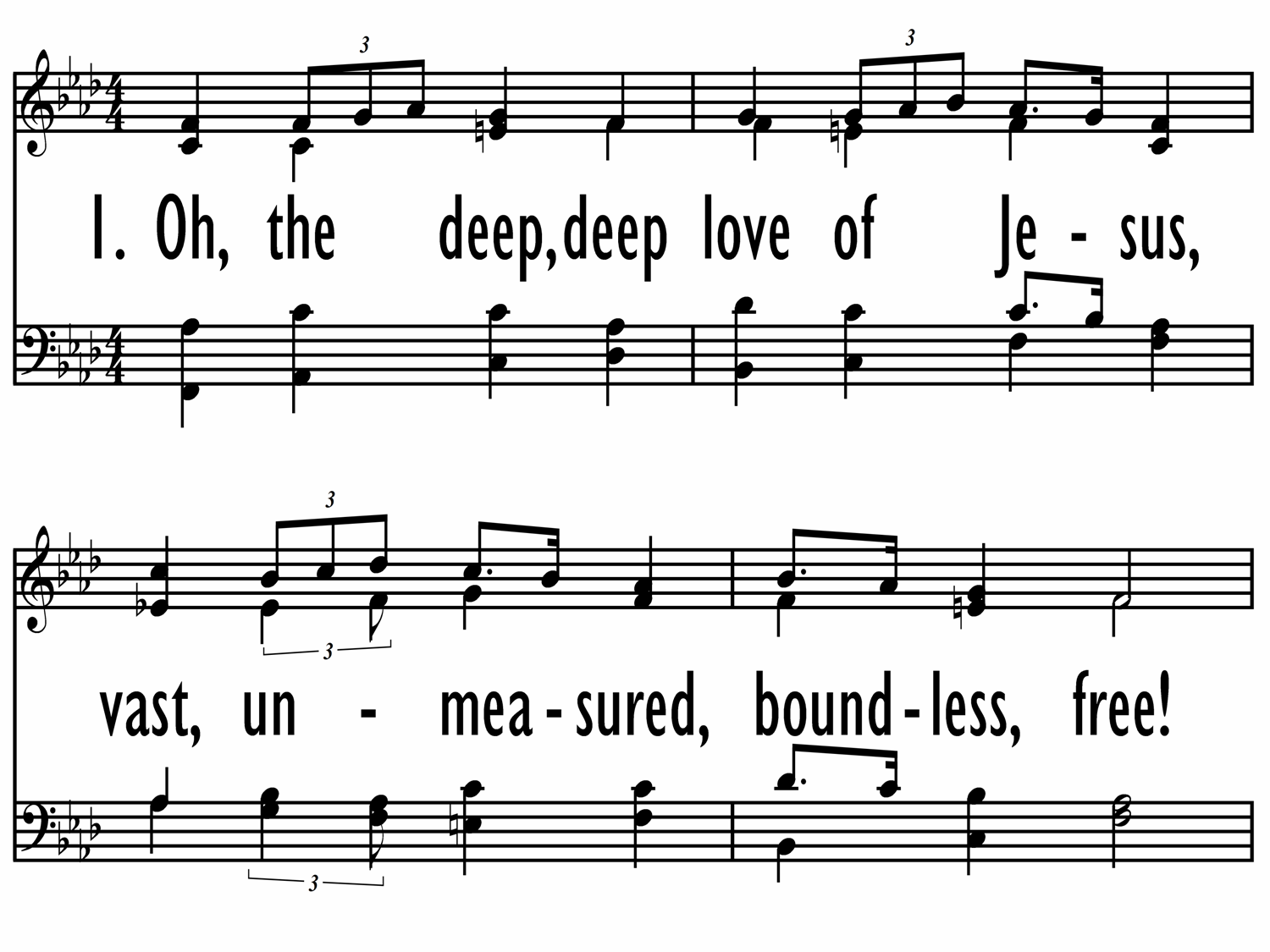- |
User Links
796
Oh, the Deep, Deep Love of Jesus
Hymn Information
- First Line
- Oh, the deep, deep love of Jesus
- Author
- Samuel Trevor Francis (1890 ca., alt.)
- Tune Name
- EBENEZER
- Composer
- Thomas J. Williams, 1869-1944 (1890)
- Topic
- Jesus Christ: Hope · Jesus Christ: Love · Jesus Christ: Savior · Mission · Elements of Worship: Baptism
Copyright Information
- Text Copyright
- Public Domain
- Tune Copyright
- Public Domain
- Reprint/Projection Information
- Words and Music: The Words and Music are in the Public Domain; you do not need permission to project or reprint the Words and Music.
Full Text
Scripture References
796
Oh, the Deep, Deep Love of Jesus
Additional Prayers
A Prayer of Thanks to Jesus Christ
Lord Jesus Christ, Son of God, we give you thanks that you who were rich became poor for our sakes. We give you thanks for your mighty life and teaching among us, for your painful and sacrificial death. We give you thanks that in your resurrection you opened a closed door and that in heaven you now make intercession for all you love. Your love is deep and vast, boundless and free. And so we give you heartfelt thanks. Amen.
—
Cornelius Plantinga, Jr.
796
Oh, the Deep, Deep Love of Jesus
Tune Information
- Name
- EBENEZER
- Key
- f minor
- Meter
- 8.7.8.7 D
Recordings
796
Oh, the Deep, Deep Love of Jesus
Hymn Story/Background
EBENEZER originally came from the second movement of an anthem ("Goleu yn y Glyn" or "Light in the Valley") by Welsh composer Thomas John Williams. EBENEZER (meaning "stone of help" in the Bible) is named for the chapel in Rhos, Pontardawe, which Williams attended at the time he composed the tune.
First published as a hymn tune in the Baptist Book of Praise (1901), EBENEZER is often associated in Wales with "Guide Me, O Thou Great Jehovah." Because an English folksinger claimed that the tune had been washed up on the Welsh coast in a bottle, the tune is known in some hymnals as TON-Y-BOTL (tune in a bottle).
—
Bert Polman
Author Information
Samuel Trevor Francis was born on November 19, 1834 in a village north of London. His father, a merchant and artist, soon moved the family to the city of Hull, midway up the English coast. As a child, Samuel enjoyed poetry and even compiled a little handwritten volume of his own poetry. He also developed a passion for music, joining the church choir at age nine.
As a teenager, however, Samuel struggled spiritually. And when he moved to London for work, he knew things weren't right in his heart. One night, as he thought of suicide while walking a bridge over the Thames, he experienced a spiritual encounter that renewed his faith.
Francis later became a London merchant, but his real passion was hymn writing and open-air preaching, which occupied his remaining seventy-three years. His hymns were published in The Life of Faith and other papers and periodicals. And he traveled widely, preaching for the Plymouth Brethren. He was known throughout Great Britain and the world as an effective devotional speaker and died on December 28, 1925, at the age of ninety-two.
—
Songs and Hymns (http://songsandhymns.org/people/detail/edmond-budry)
Composer Information
Although his primary vocation was in the insurance business, Thomas John Williams (b. Ynysmeudwy, Glamorganshire, Wales, 1869; d. Llanelly, Carmarthenshire, Wales, 1944) studied with David Evans at Cardiff and later was organist and choirmaster at Zion Church (1903-1913) and Calfaria Church (1913-1931), both in Llanelly. He composed a number of hymn tunes and a few anthems.
—
Bert Polman
Suggestions or corrections? Contact us


 My Starred Hymns
My Starred Hymns






